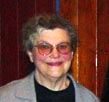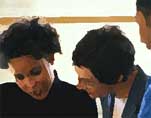Interview with Erica Dakin VoolichPresidential Award for Secondary Mathematics Teaching, 1999 |
 |
In addition to teaching, Erica Dakin Voolich heads a community-based “mathematics charity” in another community where she lives. During a career of teaching in both public and private schools and as an adjunct professor at Wheelock College, she formed community partnerships to establish the Somerville Mathematics Fund (http://somervillemathematicsfund.org). She currently teaches seventh-grade mathematics at a religious private school in Newton, Massachusetts.
How did you get started in establishing community partnerships?
I’ve always been someone who wanted to work in the community and give to the community in some way. When I won the Presidential Award and went to Washington D.C., I heard about all of the things you can do with your community and realized I’ve always wanted to do more myself. I always thought I would do it when I retired. But why should I wait until I retire? A few weeks later, I wrote a letter to a bunch of people I know, telling them that I was thinking of starting an organization for a math scholarship in Somerville.
Several people were interested and participated in an initial meeting. We had the money from the Presidential Award and a little bit of my own money, but weren’t in a position to hire a lawyer to get a 501(C)(3) or attend to any of the other details one needs to take care of when creating a nonprofit. Then someone told me about the Dollars for Scholars Organization, which is absolutely wonderful for someone who wants to start a local scholarship organization. As long as the majority of the money we raise goes for scholarships, we can be a Dollars for Scholars affiliate. We pay $200 a year. Dollars for Scholars helped us get a 501(C)(3), handles all the paperwork with the IRS, and files our tax information. They run workshops every year about how to run a scholarship organization. They also have a local person in Massachusetts who is available by e-mail and telephone and continually answers questions for us.
In addition to providing math scholarships in Somerville, we decided we wanted to do other things to encourage math learning, like teacher grants, Family Math Nights, and family problem solving in the local newspaper.
How do you juggle your teaching responsibilities with your work in the
community?
I find time because it’s my passion. We meet one Monday night a
month, and we just work in between the meetings.
What advice would you give to a teacher who wants to establish a community partnership?
It’s helpful to start by talking with people about your idea, because it will give you a sounding board and helps you shape and focus your ideas into something workable. Share your idea and ask what others think about it. When you need specific help, seek out someone who has experience in that area to help you figure out how to do it. If you have a dream, follow it, even if it’s out of your area of expertise and doesn’t seem realistic. There are people out there who will help you if you ask. I knew nothing about starting or running a charity, but I figure I am educable and many wonderful people have helped me.
What advice would you give to a teacher who wants to connect more with parents in this type of program?
I’ve involved parents through three wonderful teachers who are in the public schools who are co-planning Family Math Nights with me. They do the build-up in their classroom and talk about the upcoming event. The kids who don’t come end up hearing what a good time they missed. The next time we hold an event, those kids are going to have their parents bring them.
What advice would you give on involving other teachers in community outreach efforts?
I originally wrote letters to every one of the math teachers in the middle grades, saying I wanted to plan a citywide math night and I wanted to get them involved. I had teachers from three schools participate, initially out of curiosity. We also recently invited a couple of high school teachers to work with us in the fall to get high school kids from the math and computer clubs more involved in the Family Math Nights. They will also encourage the high school students to think about applying for our scholarships.
Another piece of advice for involving other teachers is that you don’t just go in and impose something on someone else. I really strive to create events that are co-planned, where everyone is buying in and everyone is contributing. I’m really convinced that change will happen when teachers are excited and they’re doing something they’re buying into. And their enthusiasm will then be caught by the kids. I guess you could say I’m trying to pass my passion on to others.
It was hard to get my foot in the door with some schools in Somerville though, because I don’t teach in that system. Getting the connection to the teachers and getting the news to the teachers is challenging, because I can’t depend on the system to provide the teachers with information. But, the principals at a couple of the schools have realized that this is a way to get funding for programs that they want to have and the teachers want to do. Those schools keep having teachers apply for our grants.
What advice would you give to a teacher about getting financial support for community programs?
We’ve used a newsletter for our fundraising. As a charity, I was also able to obtain a free copy of the latest census from the Chamber of Commerce. We’ve taken the Somerville census data and sorted it by occupation. Then we did a mailing to anyone who has a math- or science-related career to build a donor list. We got a small percentage to respond, but we ended up getting $6,000 or $7,000 donated. A couple of these people have ended up helping with a Family Math Night or even joined the board.
I’ve also gotten used to asking people for help and being very blunt about not having money to spend. I’ve ended up funding some things myself, too, because I want whatever money I raise to go to the kids.
What advice would you give a teacher looking for support from local businesses?
We have a partnership with MathSoft, who gives all of our scholarship winners and finalists copies of MathCad. A friend of mine works at MathSoft and made the initial connection for us. We’ve had support from local businesses for Family Math Night by literally going to them and asking. We went from one end of town to the other, hitting every pizza shop, asking for a contribution. When we did the first Family Math Night, we had 60 pizzas, of which 50 had been donated. I think having the nonprofit status really helps because we can give them a copy of our 501(C)(3) form, which means that what they’re donating is tax deductible.
How do you think your experiences with community partnerships contribute to the advancement of mathematics reform?
Based on my experiences, I am convinced that real reform comes from within. It is very hard to “legislate” reform. When the teachers are excited about doing something and have the passion to make changes in their classroom, then the real reform will happen. The Somerville Mathematics Fund not only works with teachers in co-planning Family Math Nights, but it funds exciting ideas that teachers have to enrich their teaching of mathematics.
If you have any questions you would like to ask Erica Dakin Voolich
about her experiences reaching out to the community, contact her at voolich@aol.com.

